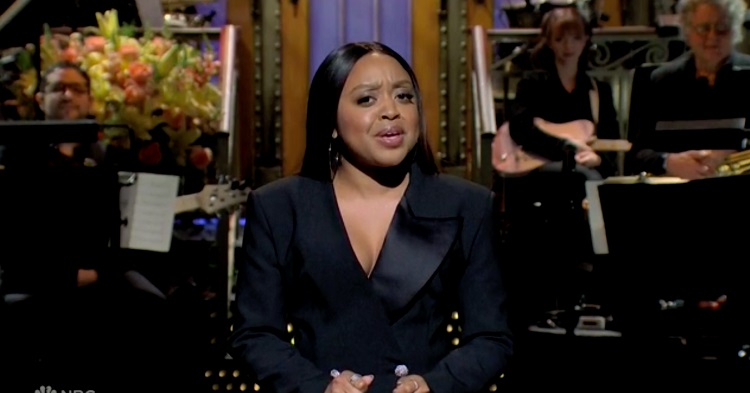In a recent spotlight moment on Saturday Night Live, Quinta Brunson, the creative genius behind the hit series Abbott Elementary, didn’t hold back in calling out the glaring lack of diversity in the iconic ‘90s show, Friends.
As she graced the SNL stage alongside a host of illustrious celebrities like Kristen Stewart, Alec Baldwin, and Steve Martin, Brunson used her platform to shed light on the absence of Black characters in Friends, a topic that has long stirred debate.
With wit and charm, the multitalented 33-year-old producer, writer, and actress showcased her award-winning comedy, Abbott Elementary, a show that delves into the lives of teachers in a predominantly Black, state-funded elementary school in Philadelphia. It’s a stark contrast to the homogeneous world portrayed in Friends.
Addressing the audience, Brunson humorously shared her journey, remarking, “I wanted to be on SNL back in the day, but the audition process seemed long – so instead, I just created my own TV show, made sure it became really popular, won a bunch of Emmys, and then got asked to host. So much easier, so much easier.”
She went on to highlight the essence of Abbott Elementary, stating, “It’s a network sitcom like, say, Friends. Except, instead of being about a group of friends, it’s about a group of teachers. Instead of New York, it’s in Philadelphia, and instead of not having Black people, it does.”

Brunson’s lighthearted yet impactful commentary struck a chord, echoing the persistent critique of Friends for its lack of diversity, particularly concerning non-white and LGBTQIA+ characters.
This conversation isn’t new. In 2022, one of the creators of Friends, Marta Kauffman, expressed her regret over the show’s lack of diversity. Her introspection led to a generous pledge of $4 million to Brandeis University to support African and African American studies.
Kauffman admitted, “I’ve learned a lot in the last 20 years. Admitting and accepting guilt is not easy. It’s painful looking at yourself in the mirror. I’m embarrassed that I didn’t know better 25 years ago.”
Her acknowledgment of systemic racism and subsequent efforts to rectify it garnered widespread support, emphasizing the overdue need for inclusivity in entertainment.
Quinta Brunson’s advocacy and Marta Kauffman’s reflection symbolize important strides toward inclusive representation in the industry. These discussions and actions underscore the pivotal role of diverse storytelling in shaping a more equitable landscape.
As we navigate these evolving narratives, it’s imperative to recognize and celebrate the power of inclusive storytelling in creating a more unified society.
In a time where societal divisions often dominate the discourse, embracing diverse perspectives in entertainment serves as a beacon of hope for a more inclusive future. Quinta Brunson’s call for representation and Marta Kauffman’s commitment to change stand as testaments to the transformative potential of acknowledging and rectifying past shortcomings.
As audiences demand more authentic and diverse narratives, creators and industry leaders are challenged to reflect on their own biases and take proactive steps towards meaningful change. By amplifying voices that have long been marginalized and championing stories that reflect the rich tapestry of human experience, we move closer to a world where everyone feels seen, heard, and valued.
Quinta Brunson and Marta Kauffman remind us that progress is not merely about acknowledging mistakes but actively working to correct them. Through their actions, they inspire us to strive for a future where diversity is not just an afterthought but a fundamental principle woven into the fabric of our cultural landscape.
In conclusion, the conversation sparked by Quinta Brunson’s bold statement and Marta Kauffman’s introspection is a vital step towards a more inclusive entertainment industry. As we continue to push boundaries and challenge norms, let us remember that true progress comes not from complacency but from the courage to confront our shortcomings and embrace change.
